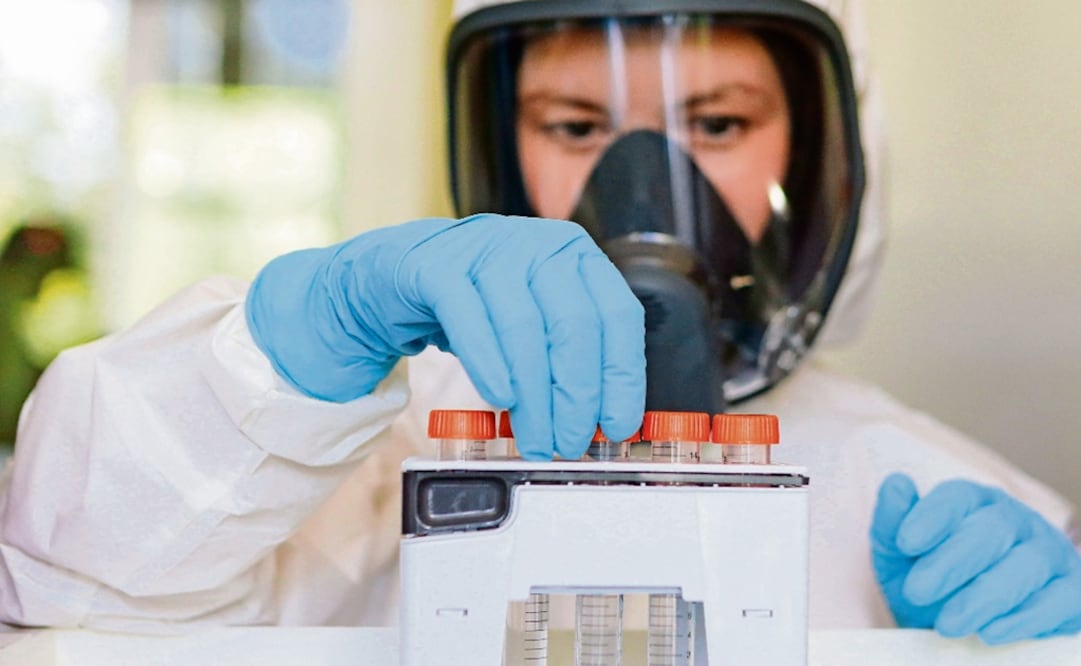Más Información

Detienen a sujeto que ingresó con vehículo a zona protegida del Nevado de Toluca; es puesto a disposición de la FGR

"No tengo nada que ocultar" asegura Carlos Torres, exesposo de Marina del Pilar; está acusado de tráfico de armas y lavado de dinero

Despliegan operativo de búsqueda para localizar a la tiktoker “Nicholette”; fue privada de la libertad en Culiacán

Partido Verde esperará iniciativa de reforma electoral para presentar su propuesta; Manuel Velasco destaca diálogo

Más de 300 periodistas encarcelados en el mundo en 2025; China, Birmania e Israel encabezan la lista, alerta CPJ
There are different investigation lines regarding pharmacological treatments to face the COVID-19 pandemic . First, there is research on antivirals, that is, the drugs used for treating infections caused by viruses. In the history of medicine, there is a tradition in the development of drugs like antibiotic, nevertheless, antivirals are a science field that has had a slower development.
The Discovery of the first components of this kind took place until 1950 and it was not until a decade later that two of them began being clinically used. The development of genetics and more accurate techniques to know the complexities of viruses have helped with their creation. Most antivirals used nowadays were created during the last 30 years.
The objective of their design is to suppress viral reproduction. The drug must be active against the target virus , inhibiting some essential steps for its metabolism. The premise is that antivirals could be effective for many varieties of viruses or even between different species of viruses in the same family, nevertheless, things have not always been so simple.
An open door for an old-new drug
Nowadays, there are tools to reduce the time to design a drug based on newly developed molecules, however, these periods are still long and the pandemic demands multidisciplinary efforts to face the new enemy. So far, scientists have not been able to develop specific drugs against SARS-CoV-2 . Testing existing drugs to combat other diseases can offer certain advantages.
Recommended:
Regarding antivirals, there was a name that emerged from the beginning of the pandemic: remdesivir, a drug used against ebola that was not really helpful to fight that disease but that showed certain efficiency in treating other coronaviruses , such as MERS and SARS.
In February, researchers showed the drug was able to reduce viral infection in human cells cultured in a laboratory. Nevertheless, their effectiveness in clinical trials was highly debated. While Gilead Science’s drug clinical studies in the U.S. pointed at 30% faster recovery than with the placebo , other clinical trials performed in Asia reported less significant data; nonetheless, experts like Anthony Fauci, director of the National Institute of Allergy and Infectious Diseases (NIAID) said that due to the discouraging environment, the drug was at the top of the possibilities.
Fauci said that the Discovery reminded him of the 1987 approval of the AZT antiretroviral that helped fight the infection by HIV. The first random clinical trial showed only a light recovery but researches “kept building over that success.”
Starting on May 1st, the FDA authorized the emergency use of remdesivir on people with serious cases. In early May the Science magazine published an article that made reference to the possibilities of remdesivir as a template to try to improve the drug.
With open possibilities, Gilead started to increase the production of remdesivir, even before its approval. By late May, the company would have produced enough to treat 140,000 patients. The company hoped to produce enough drugs to treat over 1 million people by the end of the year.
Recommended:
International random research
It must be stressed that this antiviral leads the list of the Solidarity clinical trial, an effort led by the World Health Organization to help find an effective treatment for COVID-19. This international clinical trial compares four options for treatment to evaluate their relative efficiency.
Since April 21, over 100 countries are part of this project to find efficient therapies. The objective is to find, as fast as possible, if any of the drugs hamper the development of the disease or improves survival. The idea is to finally be able to add other drugs according to the evidence that results from the tests.
Until there is not sufficient evidence, the WHO warns about the risks of administering unapproved treatments to patients with COVID-19. The WHO is particularly concerned with cases of people who self-medicate with chloroquine and hydroxychloroquine. These substances are used to treat malaria and rheumatic conditions, correspondingly. In China and France, small tests provided some indications about the possible benefit of chloroquine phosphate against pneumonia caused by COVID-19, but they require more aleatory trials.
Recommended:
The WHO research also considers the combination of lopinavir and ritonavir, inhibitors of protease that are used with other drugs to treat HIV. Interferon beta, used to treat multiple sclerosis, is also part of the study. In addition to Solidarity, another important trial that uses random tests is Recovery in the UK.
It must be stressed that the second line of investigation includes immunomodulating drugs, substances that are able to modulate the body’s defense reactions so that the immune system does not react with exaggeration and causes additional damage. Many existing drugs have been developed for arthritis or intestinal inflammatory diseases.
With this same idea of why to develop new drugs to fight the replication of coronavirus if there are probably some already approved substances that could do the same, a team of researchers led by Thomas F. Meyer from the Max Planck Institute in Berlin is working with different clinically approved drugs.
Through the CRISPR/Cas9 genetic edition technique as well as the interference of RNA, a mechanism inside the cell that allows it to deactivate a specific protein as a defense against pathogens, scientists have identified several proteins of the host cell needed by coronaviruses for their replication.
Recommended:
According to their data, the researchers discovered that a variety of viruses depend, up to a certain extent, on the same signaling pathways in the host cells and discovered that there are already drugs that work against some of them. That is how they are testing compounds that have already proven to be in vitro antivirals to evaluate their capacity for inhibiting the replication of SARS-CoV-2 . One of the substances that were originally developed to treat cancer and fight hepatitis C has stood out for it also inhibits the replication of MERS.
Beyond the shelf of the existing drugs, regarding pharmacological development , there is yet a third line of investigation with a range of innovative treatments based on antibodies from people who contracted the new disease. This kind of drug focuses on new efforts and involves a new version of the legendary convalescent plasma in which a person who has recovered from coronavirus donates blood to someone who is sick. This kind of treatment is considered a kind of bridge before the highly expected vaccine arrives.
mp
Noticias según tus intereses
[Publicidad]
[Publicidad]










